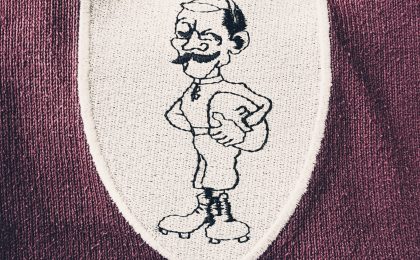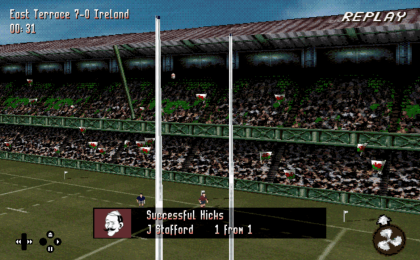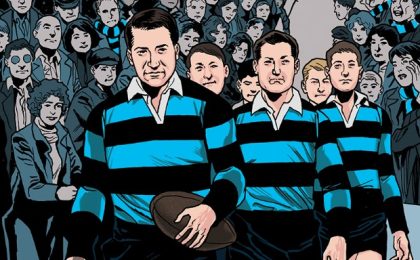Considering the Welsh Rugby Union’s prominence in the cultural, political and sporting landscape of Wales, it is remarkable that until November 2023, no serious attempt had been made to chronicle its failings, follies and flaws.
Finally, a book has arrived that examines key events from the past four decades in the Welsh game and shines a light on the WRU and how it brought Welsh rugby to the brink of complete structural and financial failure. Seimon Williams’s ‘Welsh Rugby: What Went Wrong’ is essential reading for all involved in Welsh rugby and, perhaps, all involved in political or public life in Wales.
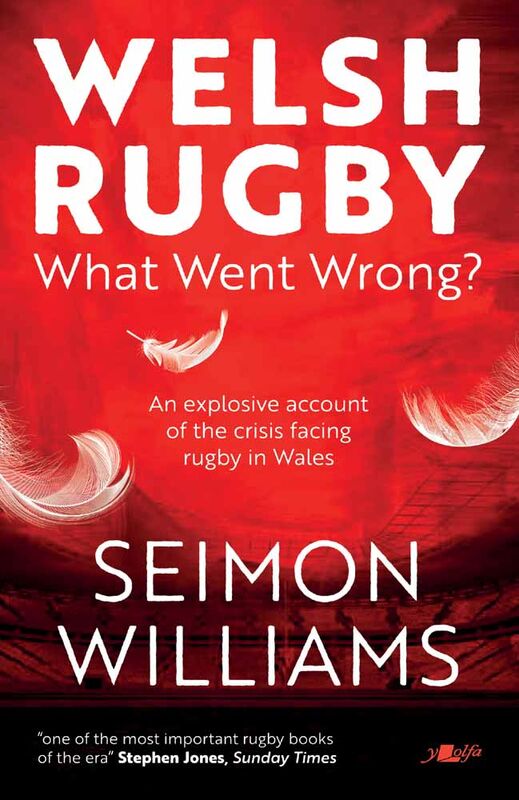
Today, The East Terrace publishes an in-depth Q&A with the author. We cannot recommend the book strongly enough. It is telling, perhaps, that such an important volume has emerged from an ‘outsider’, rather than a key journalist or broadcaster within Wales.
Q&A with Seimon Williams
Can you start with telling us your background and interest in Welsh rugby?
I was born and raised in three villages to the west of Swansea, all pretty much halfway between the centre of Swansea and Llanelli, in the mid-1970s. From a young age, my dad would take me to watch “the match” on a Saturday – whether at St. Helen’s, Stradey, sometimes the Gnoll or Cardiff Arms Park, and sometimes, heaven forfend, the Vetch – we’d look at the previous day’s Evening Post and pick the game we fancied – and I developed a passion for the game from that point.
My dad also had a pile of rugby books, many of them autobiographies of the greats of the 1970s who were coming towards the end of their careers at that time, and were about to professionalise themselves by writing about it all. I loved reading all about those wonderful players, even as a kid.
As time went on and my general lack of playing ability made itself more apparent, I settled into a pattern of playing football and cricket but following rugby. When the internet came along, I discovered a new website called Gwladrugby, set up by a Welsh exile in London, who was then joined by a gang of others in the same boat. I started writing articles for the website in the early 2000s, and, while most of the others who wrote what we then called front page articles and later blogs, grew up and found more constructive ways of spending their time, I continue to do so, albeit more sporadically these days. It became a real community, and a really good resource for learning about the game, including its politics.
How did this book come about? Had you been considering it for a while?
The rather unlikely truth is that I was approached, out of the blue, by the commissioning editor at Y Lolfa, the publishers based in Ceredigion who have carved out a bit of a niche for themselves in recent years with several English-language books on Welsh rugby. He had come up with the idea of commissioning a book about the catastrophic state of Welsh rugby in early 2023, and he’d read some of my blogs and thought I might be interested in taking on the project. This was in late February, around the time of the Wales-England game. We all remember the chaos of that time – the home defeats to Italy and Georgia, Wayne Pivac’s sacking and Gatland’s return at the end of 2022, the struggles of the professional clubs, the lack of care paid to the women’s game.
And then we had the BBC Wales Investigates programme into the culture at the WRU, and the accusations of sexism, misogyny, homophobia, racism and bullying. And then, in the week of that England game, the threat by the players to strike as the endless prevarication over a new financial agreement between the WRU and the professional clubs meant that over 70 players were coming out of contract and had no certainty about where they would be in a few months.

Author Seimon Williams.
So, a speculative email appeared in my inbox from the publishers, asking whether I would be interested in meeting to discuss writing a book about the whole shambles. After that first meeting, I prepared a synopsis of what I might do with the topic, outlining a basic structure.
My view was, and remains, that many of the problems which have beset Welsh rugby in the last year or so had their roots in the way that the WRU has administered the game over many years. I felt that there was no way of understanding why everything seemed to be falling apart in early 2023 without going way back to the game going open in 1995, and in fact going back to the 1980s, and tracing all the huge changes which the game has seen over that period.
That seemed to be a neat date to start from for several reasons. Firstly, it marked the beginning of Welsh rugby’s second century and the end of those golden years of the 1970s, when the game here led the way in Europe, if not the world. Secondly, so much of what went on – from the links to apartheid era South Africa, to shamateurism, to the game going open and all that that unleashed, to the rebel season and cross-border leagues and eventually the creation of the current structure and the tensions between the professional game and the Union – is barely remembered or understood. Or, if it is, there are various wildly differing versions, not all of which can be true. And finally, and most importantly, it’s the point at which my memories of following the game start!
And there was a clear gap in the literature. The WRU’s centenary season spawned many books, notably Dai Smith and Gareth Williams’ ‘Field of Praise’. There have since been plenty of personal recollections of specific periods as recorded in autobiographies, there are plenty of retrospective newspaper articles looking back on key events, but there isn’t – or wasn’t, until now – an overarching look at the whole period. There wasn’t anything you could refer people to and say, “this is what actually happened – here it is, referenced and cross-checked”. And that was such a frustration. So, I put my proposal to Y Lolfa, they liked it, and, with the support of the Welsh Books Council, they commissioned it.
📱Ffolio, is our platform for audio and e-books.
📱English and Welsh titles available.
🛒Support a bookshop when you buy.
⬇️Browse today:https://t.co/PFW9eNG20e#LoveReading #ChooseBookshops #Ebooks pic.twitter.com/LBptKUUtIB
— Books Council of Wales (@Books_Wales) November 29, 2023
Why do you think no one has written this kind of book about the WRU before? It seems such an important (and obvious) book for someone to write.
I’d wondered exactly this during endless, circular online arguments. It seemed, as you say, such an obvious book to write, and I found it strange that no such book existed.
I remember being involved in online discussions with Western Mail journalists and others working in the Welsh media during the 2013-14 stand-off between the WRU and the professional clubs. They kept saying that, actually, stories about rugby politics were a turn-off. They were driven to collect clicks, and more people wanted to read interviews with retired players or yet another article about who was going to play 10 for Wales than anything about financial agreements or the balance of power between the professional clubs and the Union. And, let’s be honest, to many if not most Six Nations watchers, ‘the rugby’ is just that – they aren’t particularly interested in the rest.
Wales is a small country. Everybody knows each other, particularly everybody working within a particular sector. As we’ve seen with the stories about the internal working culture of the WRU, it’s very easy to become institutionalised, to get swept along with accepting, or at least not pushing back against, behaviour which shouldn’t be tolerated. And the WRU was arguably, until devolution, Wales’ most high-profile and powerful national institution. They didn’t come any bigger. I don’t think this lack of challenge was deliberate, at least on a large scale. Most people aren’t complete bastards, so you’ll probably get along with most of the people you deal with regularly in your working life. And then, when people on the outside start chucking brickbats at these people that you know and like, your instinct can easily be to side with the people you know and like, not the people you don’t know, the people who may be chopsing online.
Some of it is about access. There’s a reference in the book to the time a BBC journalist, who had ghosted a player’s autobiography, was effectively thrown out of a national squad press conference by the players. Many of the really challenging reports I turned up in my research, at least from the earlier period, were from journalists working outside Wales. There were remarkably few outright critical pieces from journalists working for Welsh outlets. And I think that pattern continued right up until very recently. If your job depends on access, and we’ve seen how the WRU has used and misused its power over the years, there is incredible pressure not to burn bridges.
I’m in a relatively fortunate, detached position in that my professional life has absolutely nothing to do with Welsh rugby, so it doesn’t really matter – professionally – if I upset anybody involved in Welsh rugby. Obviously, I don’t want to go out of my way to be deliberately offensive, because I’m not a complete bastard either, but I don’t need to be particularly careful – beyond libelling anybody, obviously – about what I think and write, because my livelihood isn’t going to be affected.
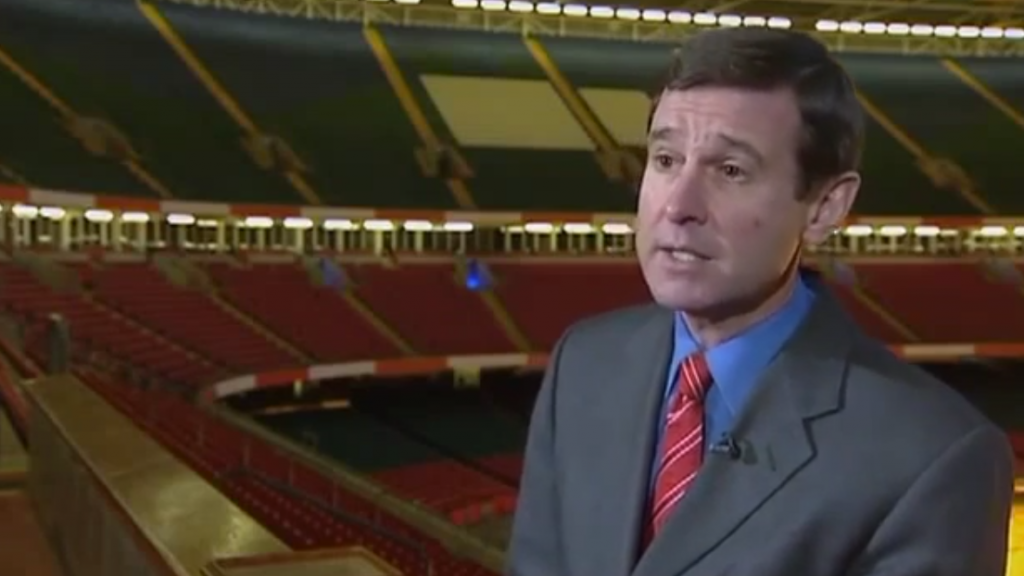
Roger Lewis, former CEO of the WRU
Can you tell us about the research process? How did you even begin to start what must have been a mammoth task? What were your sources and reference points?
One of the joys of having been involved with Gwladrugby over the years is that a lot of the issues I wanted to cover had been covered by writers on the website over the years. I had many of these articles saved away, particularly my own, but then I discovered this wildly addictive rabbit-hole called the Wayback Machine. It’s basically an online engine which took snapshots of what was online at various points over the past 20+ years or so – nothing ever really disappears from the internet!
So that was my starting point. Then I started following links from those original articles, cross-checking and verifying as I went along, building a ridiculously unwieldy spreadsheet of articles, links and comments.
I knew of several books, and found more, particularly autobiographies, which had a lot to say about certain events at certain points in time. And I became almost addicted to adding to my rugby library. I’ve now completed my set of Rothmans Annuals (except the first one in 1972 – if anybody has this, and they want to get rid, I’d be delighted to give it a good home), I’ve all bar two of the Welsh Brewers/Buy as you View Annuals, and I even have the full set of Playfair annuals back to 1948-49. I kind of lost my mind for a bit, I think. But they were incredibly useful in fact-checking newspaper articles and autobiographies.
I wanted to make sure that the book was factually sound. This was partly about making the book credible. I’m not a ‘name’, in that I’m not a famous player or coach or journalist or administrator. I’m just a fan who has spent far longer than is healthy thinking about and blogging about the game. And I was very conscious of the risk that people would look at the book and ask, “why should I care what this bloke I’ve never heard of thinks about Welsh rugby?”. So, it had to stand on its own feet as a reliable, credible, accurate record.
So, the book has twenty-three pages of references! Interpretation and opinion will obviously vary, but a book such as this – which in part is intended to provide a robust history of the period – needs to be factually sound. I hope it is, although I’m sure people will find something to query!
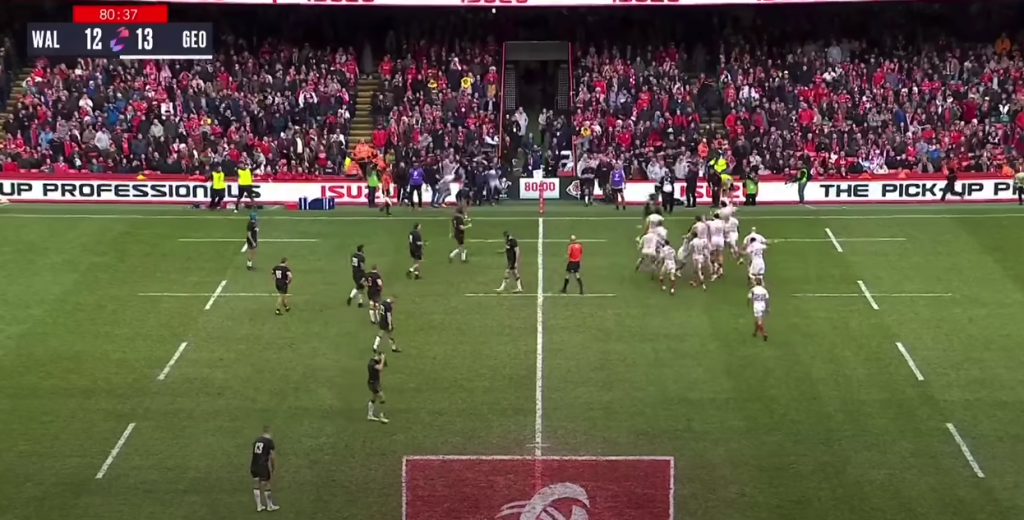
Georgia win in Cardiff.
What was the writing process like? I can see how it could be quite despairing and leave you feeling quite cynical? You must have had to control your anger at times.
For quite a while, I wasn’t sure how to marshal the disparate strands into a coherent narrative, particularly whether I should try to take a thematic or chronological approach. In the end, the dead hand of the WRU’s administration of the game seemed to be at the centre of most of the crises and wrong turns, and, as so many seemingly unconnected threads fed into major events, I took a chronological approach.
It was then a matter of picking periods. Many of these chose themselves, really, focusing around one or at least a small number of significant events within a particular period. So, there’s a chapter about the dawn of professionalism to the rebel season of and the final rejection of an Anglo-Welsh league in 1999. There are sections on the Moffett years. There’s a chapter (with guest appearances in others) on the Roger Lewis period.
It was infuriating at times. I found myself, on several occasions, becoming so annoyed about something that I’d start telling my utterly disinterested family about what some committeeman had done twenty years ago. Or I’d find myself furiously tweeting bits out. I remember reading one article, which had been published in ‘The Welsh Mirror’ (remember that?) around the time of the WRU clubs’ rejection of the Tasker Watkins report in 2002, which went through each member of the General Committee, listing their backgrounds and views. It was amazing, and maddening. So, it was difficult to avoid blabbing all the good bits all over social media.
Once I had the structure and much of the desk research had been done, I went looking for interviewees. I felt that I needed to have these to bring the book to life. I was lucky to secure interviews with several people who had major parts to play in the story of Welsh rugby over the past 40 years or so. There were others who didn’t want anything to do with a book such as this. I can understand that, to an extent, although it would have been good to have had their perspectives.
Was there a lot of material you simply had to leave out due to time, or even legal, constraints?
This is the type of book for which the research could go on forever, with the result that the book itself would never be finished. The intention at the outset was to get this ready for the end of Wales’ Rugby World Cup campaign. At the time, back in March, after thumping defeats to Ireland and Scotland, it looked as though that might be at the end of the pool stages. So, it was quite a task to go from nothing on March 1st to a finished book in mid-October. In the event, Wales’ better-than-expected showing – in flashes, at least – meant that we at one point wondered whether we would be able to release the book this year. Ultimately, the disappointing quarter-final exit gave us the impetus to get it finished and released before Christmas, which we just about managed.

A well rewarded former employee of the WRU.
But even then, things kept happening. After the Six Nations, we had the sudden retirements of Alun Wyn Jones and Justin Tipuric, players such as Ross Moriarty, Rhys Webb and Cory Hill making themselves unavailable so that they could take up club contracts, the shambles of Joe Hawkins’ eligibility. It would have been good to have the AGM in November, and the results of the subsequent elections, referenced in the book. And, hanging over everything, of course, was the Rafferty inquiry into the WRU’s culture. There were rumblings that it would report before or during the World Cup. In the event, it reported while the book was being printed, days before it was released. The trouble with Welsh rugby is that something – often bad – is happening all the time.
Was this book a complex process from a legal point of view?
I wanted this to be a factually robust book, one which the reader could trust to be correct, or at least supported by multiple sources, to ensure that there was nothing in there which was factually inaccurate, so I’m confident that there’s nothing there which could be complex from a legal perspective. Neither did I want this to be sensationalist, or any kind of ‘gotcha’, so I stressed to interviewees that I would check any direct quotes with them for accuracy – and to confirm that they really wanted particular stories to be included – before publication. I spoke with some people off the record, and some of their stories were really interesting but not always verifiable or sometimes quite personal – I steered away from some of these. Some of them would have been quite useful in terms of generating interest in the book but may have detracted from its purpose.
What was the biggest revelation for you when researching this book? Something that shocked even someone as familiar with WRU incompetence or mismanagement as you.
I think the overriding feeling I had on completing the book wasn’t that I’d really found anything revelatory, but that my suspicions about the way the WRU had been run over the years were, somewhat depressingly, not that wide of the mark.
The reporting around the time of the Tasker Watkins report, Glanmor Griffiths’ counter-proposals, and then eventually the stumble into ‘regionalism’ emphasises, time after time, that pretty much every organisation and individual was acting entirely selfishly. WRU General Committeemen (and they were, until 2015, all men) jealously guarded their positions, major clubs wanted their slice of the cake to increase, clubs just below that level wanted to protect their chances of getting their teeth into some of the cake, the junior clubs wanted to bring everybody else down a peg or two. From this distance – and probably even at the time – the naked self-interest is so clear.
Then there are the stories from 2015 – we’re talking here about 8 years ago, not the distant past – where the rampant misogyny of the Union is laid bare. In particular, the practice of, on Six Nations weekends, ‘the men’ having their own bus to take them to their own dinner, while their partners (because there were no women on the WRU Board at that time) were fed in a different room having travelled to the venue on a different bus. And then, at the match itself, the men would sit in the best seats while their partners could attend but would sit behind their men. And when this practice was challenged, it appears to have consumed the minds of those committeemen, to the detriment of other elements of their work, such as agreeing the Union’s strategy and budget. It’s mind-blowing stuff.
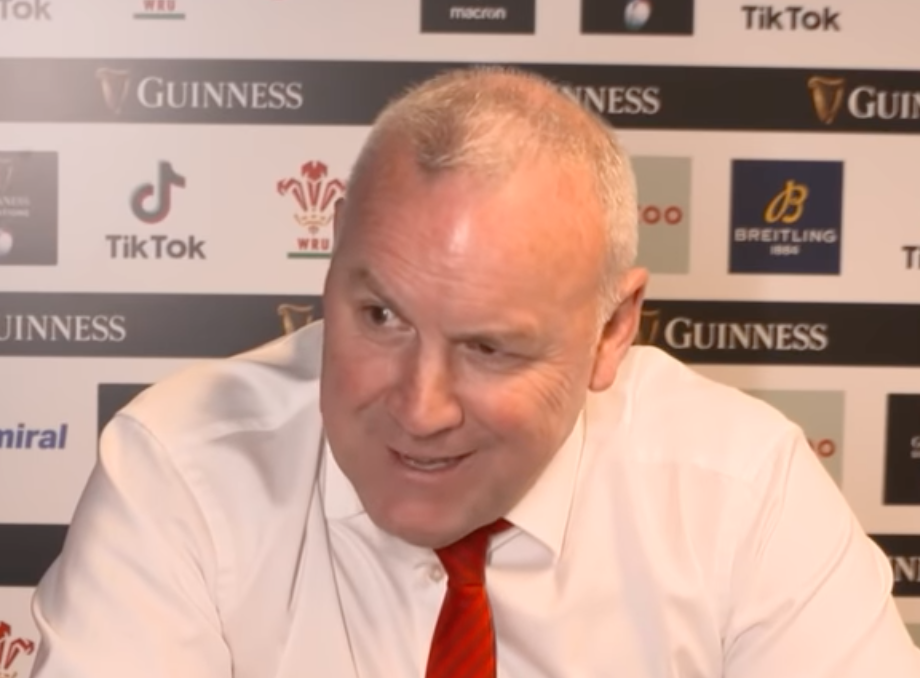
Former Wales coach Wayne Pivac.
But ultimately, it’s about how ill-equipped the WRU has been. It has never been able to run the game properly because it has never had the right structures, the right people, with the right skills, to work properly. Stephen Jones, the Sunday Times journalist who was kind enough to write the foreword, challenges the reader to name three great administrators of the Welsh game, beyond Ray Williams and Gareth Davies. And it would be a struggle to do so. There’s a quote in the Rafferty report about committeemen knowing they were out of their depth, knowing that they wouldn’t know what to do with the answer to a question they wanted to ask of the executive, so it was best to just not ask the question at all. That’s pretty frightening.
The book seems to have been really welcomed by fans, how has the response been elsewhere?
The reaction has been pretty positive, and really touching. Friends have been fact-checking and proof-reading the book, so I have somebody to blame for factual or grammatical errors, which is always handy! So many people who I only know virtually – people off Gwlad or Twitter – have been so supportive; again, some fact-checked and proofread the book, and others have been spreading the word. It’s being picked up by fans from other countries – there seems to be a particular interest from Irish fans, for some reason! I’m getting lots of photos, shared on social media, from people who are reading and enjoying the book, usually with something alcoholic in front of them. Which is completely understandable but also mildly alarming! It’s been out on Kindle for a couple of weeks now, and has been doing quite well, as is the paperback version.

Have you made sure key figures in the game get a copy?
I haven’t yet been presumptuous enough to say “oi, new WRU people, read my book on how not to do it”. I hope people will read it and find it interesting. It would be nice to think that some of the new faces on the WRU Board might dip into it, just to familiarise themselves with some of what they may be about to face!
Have you had much reaction from the Welsh media on it yet?
So far, the reaction has mainly been in the Welsh-language media. I’ve had the opportunity to speak on S4C’s ‘Newyddion’ programme about the Rafferty report (they kindly allowed me to have the book onscreen while they filmed!), and an interview on Radio Cymru specifically about the book. It’s had some take-up in local media and nation.cymru ran a piece this week. I’ve had invitations to appear on several podcasts to talk about the book, which I’m really looking forward to.
Looking forward to getting stuck into this.
Best of luck with the book @CapS45 pic.twitter.com/zu3JUNDoto
— Jamie Phillips (@JNPhillips4) November 26, 2023
Have you had anyone getting in touch with you (for better or worse) about the book since it came out?
The feedback has been uniformly positive so far, which clearly won’t last. Some of the people I spoke to in researching the book have been in touch, and they seem to be pretty happy with it. I’m starting a new column in Welsh language magazine ‘Golwg’ before Christmas off the back of the book, and there are also a few exciting potential spin-off projects which I’m discussing at the moment.
Are you optimistic about the future or do you think the game is potentially irrevocably damaged now in Wales?
The hope must be that everybody involved in Welsh rugby realises that this is – or at least, should be – rock bottom. The WRU’s invincibility, its imperviousness to outside criticism, has crumbled over the past year. Just over a year ago, its member clubs failed to vote through – in sufficient numbers – amendments to its constitution which would have further professionalised the WRU Board.
The events of the first few months of 2023 made such an impact that the EGM vote in March went through with almost unanimous support. A new Board is taking shape, with a range of experiences now represented. A new chair is now in place, a new CEO will start work in the new year. The Rafferty inquiry has reported and the new WRU Board has undertaken to implement its recommendations in full. The women’s game is now being taken more seriously, with professional contracts for national squad members for the first time and the creation of new regional teams to take part in the Celtic Challenge. A new competition is being proposed in an attempt to close the gap between the men’s community and professional games, although this is still uncertain for the moment.

All of that offers hope for the future. It suggests an organisation that realises that it cannot continue as it has for, well, the last 140 years.
There are, of course, reasons for concern too. While the WRU now has a new Board, three of the four district representatives who were there through at least some of its recent troubles were re-elected last month. While the new chair has suggested that the professional tier is essential to the success of the game in Wales – obvious, maybe, but it hasn’t always been made explicit over the past 20 years – there are no signs, yet, of any changes to the PRA. If that agreement endures, Welsh regions – already bouncing along at the bottom of the URC table – will be even weaker next season. There’s a real risk – and we’re seeing it now in the declining crowds this season – that supporters and sponsors will just lose interest in the game. From there, it could become an unstoppable spiral of decline.
So, I feel there is hope that the top of the WRU has been changed beyond recognition, and that there is an understanding now that the procedures of the past are no longer acceptable. The risk – as you suggest – is that the game in Wales has been irrevocably damaged over recent years. I don’t think I can remember the being in such a mess in my lifetime – at other times of crisis, there’s usually been at least one part of the game which has been in reasonable fettle – so there must be a concern that we are nearing the point of no return as a serious rugby nation. We can only hope that we will now reset and rebuild the kind of game we all want to see.
Order your copy of ‘Welsh Rugby: What Went Wrong’ direct from the publisher or from any good bookseller.



